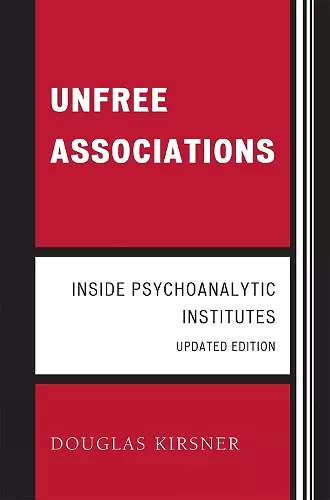Unfree Associations
Inside Psychoanalytic Institutes
Format:Hardback
Publisher:Jason Aronson Publishers
Published:28th Apr '09
Currently unavailable, and unfortunately no date known when it will be back

This is the most thorough, revealing, and illuminating account of the inner workings of psychoanalytic institutions that has ever been written. It comprises ground-breaking, in depth, recent political histories of the four leading psychoanalytic institutes in the United States—New York, Boston, Chicago, and Los Angeles—based on the author's extensive field work. Kirsner also provides dramatic insights into what psychoanalysts and their institutions have contributed to what has gone wrong with psychoanalysis. The result is a fascinating series of portraits of these institutes—their organizations, their cultures, their ways of mediating conflict, and how they have survived. In addition to archival research, the book is built on scores of interviews with prominent psychoanalysts who were often protagonists in the stories of their institutes.
Many themes emerge in Kirsner's gripping yet scholarly accounts. Most importantly, he demonstrates that issues surrounding the right to train are central to psychoanalytic disputes. Unfree Associations examines the problems of psychoanalysis, a humanistic discipline that has been touted as a science on the model of the natural sciences but has been organized institutionally as a religion. Interest in this book should not be confined to psychoanalysts. It is a rich set of case studies in the vicissitudes of group relations, with the ironic twist that the members of these organizations profess to have special insight into human nature and how people get along with one another.
The relevance of an American edition of Douglas Kirsner's book cannot be exaggerated. It is a fundamental contribution to the concerns of the North American Psychoanalytic Community with the present challenges to psychoanalysis in our culture. . . . Warmly recommended to all professionals engaged in psychoanalysis and psychoanalytic psychotherapies; particularly, of course, to all those engaged in participating, as students or teachers, in psychoanalytic education. -- Otto Kernberg, M.D., past president, International Psychoanalytical Association
This interesting book is easy to read and may appeal to a wider audience. . . . Psychoanalysis stands as a cultural fact and Douglas Kisner provides a valuable account of a little-known world. * Metapsychology Online *
Douglas Kirsner's must-read book has become a classic for the study of what holds psychoanalysis back as a science and an institution. This book describes Kirsner's methodological study of the four most influential institutes in the American Psychoanalytic Association, which is still the most dominant single analytic force in the United States and a powerful force in the rest of the analytic universe. Documenting the stagnation, arrogance, and even corruption of these institutions, he shows in exquisite detail how they have stifled growth in the field, lowered morale in training, and cut psychoanalysis off from the nurture of its contemporary sister disciplines like neuroscience and research. Now, with a new epilogue documenting current efforts at renewal, and the still remaining forces of regression, and with a vigorous introduction by Otto Kernberg, recent past president of the International Psychoanalytic Association, this book is more relevant than ever. All students and adherents of psychoanalysis need to read this fair, tough-minded book to see what must be addressed if psychoanalysis is to become a renewable modern resource for the study of development and the benefit of patients. -- David E. Scharff, M.D., International Psychotherapy Institute and the IPA Committee on Family and Couple Psychoanalysis
ISBN: 9780765706836
Dimensions: 239mm x 165mm x 28mm
Weight: 717g
354 pages
Revised edition